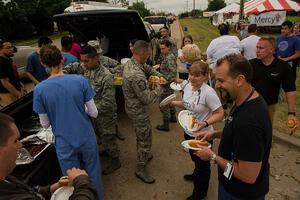The Passover Challenge: Discovering What We Take for Granted
This month our Rising Voices Fellows explore their relationships to Passover traditions. Be sure to check the JWA blog each Tuesday for a new post from our fellows—and check out the great educational resources provided by our partner organization, Prozdor.
Even though the snow has persisted through and beyond the winter season, I am glad to acknowledge that spring is finally here! But before my junior year of high school comes to a close, I still have to cross some bridges before I can sail into summertime mode. Along with my upcoming AP exam, finals, and SAT test, I will shortly face the ultimate Jewish challenge: Passover.
For those who follow the Passover tradition where all grains are cut from the daily diet for eight days, then you certainly know that blissful feeling during break-fast when you take a big bite into that challah and think “wow, I will never take bread for granted again.”
But maybe we fail to see what we really take for granted. For one, I know that my summertime dance friends from South Africa do not have nearly as many insane Ben and Jerry’s ice cream flavors or 42-oz. sodas in their supermarkets. Americans are spoiled rotten when it comes to food. We have the luxury to consume it by the bucket-loads and still leave 40 percent of the entire country’s food uneaten without a moment’s uncertainty as to when our next meal may come.
Something about that makes my blood boil. Hunger and malnutrition are major issues for a billion people on earth, but many Americans still turn a blind eye and continue to indulge in their Happy Meals and Five-Dollar Footlongs. About 2.6 million children die each year from hunger, and for me, the Jewish texts that obligate us to fight against these global tragedies are stories like Passover. The mother’s tragic loss of her firstborn in the Passover story can serve as a yearly reminder that mothers all around the globe still lose their children every second of each day. In addition, the Egyptian mothers in the Passover story whose firstborn sons are killed by the Angel of Death remind us that tragedy can happen to people on any side of a political divide. Even in America, one out of five kids live in households that struggle to put food on the table, which severely impacts a child’s educational, physical, and psychological development.
Luckily, organizations like the American Jewish World Service strive to solve the hunger epidemic. For nearly three years, AJWS has rallied and petitioned for a more effective U.S. food aid policy in their “Reverse Hunger” campaign. AJWS President Ruth Messinger finds it especially important for the Jewish community to push the U.S. government to sharpen their policy on hunger because, as she says, “Our Jewish texts and teachings obligate us to challenge the injustice of hunger and champion the right to food.”
As Jews, we are capable of coming together like the AJWS and step by step, win battles against hunger. We can help by participating in food drives, volunteering at homeless shelters, helping in local food pantries, and participating in walks for hunger. Appreciation plays a lot into the Passover holiday, when we listen to the story of our ancestors in Egypt this spring, we can now show empathy for their hardships, and channel that compassion to help those struggling in the world today.
This piece was written as part of JWA’s Rising Voices Fellowship.







I never considered that perspective on the story of the slaying of the firstborn until reading your article! Not only does it make sense, but it makes the story relevant to all of us, today.
I never really knew and understood Passover, thank you for this great and concise article. I now understand this vitality of this holiday, and my respect and honor for all those who identify as Jewish is on another level!
In reply to <p>I never really knew and by NMI
Thank you so much! I am glad this could reach those who may not have necessarily understood unique Jewish rituals like passover!
Fasting is a way to come closer to God spiritually, but we are grateful when that time has come to pass. Children going without food, or eating poorly don't see an ending time. They suffer in our own cities. Your outreach in love to people who are or have gone hungry lifts my heart. Thank you for your well written blog.
In reply to <p>Fasting is a way to come by Baba
Thank you Baba! I agree, fasting is a great time to reconnect with your religion spiritually. It is definitely unfortunate that children even in resourceful places like Boston are going days without staple meals!